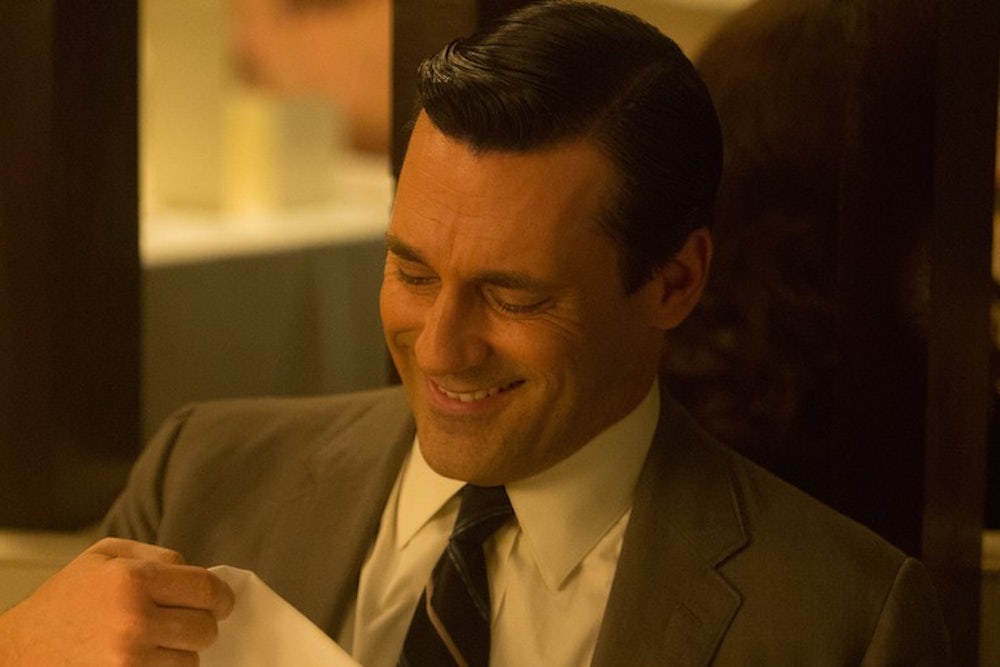Eight long minutes pass before we see Don Draper in tonight’s premiere of “Mad Men,” and I can’t say I missed him. Last season, the show’s sixth, seemed to lose itself in Don’s downward spiral, ignoring the show’s most interesting characters (ahem, Joan) for thirteen episodes of a pallid, sweaty Jon Hamm destroying relationships and disappointing people and drinking his life away. “Don, instead of being the show’s engine, has become its anchor,” wrote Emily Nussbaum last May, in an article titled “Mad Men’s Don Draper Problem.” So if we’re going to marginalize Don to spend more time with Peggy, Joan, and Roger, would anyone really complain?
But then Don made his grand entrance tonight, emerging into the California sun to the groovy sound of the Spencer Davis Group’s “I’m a Man,” with Megan approaching him in slow motion in a baby-doll minidress—and I was briefly seduced by the Draper mystique all over again. Here he was in all his alpha male glory, selling the “Don Draper” mythos as easily as ever. That gorgeous, sexy sequence was a bit of a joke, though, a commercial for a man whose life has stopped being an ad campaign. Last season ended with a moment of honesty and a hint of redemption, as Don unburdened himself in front of Hershey executives and brought his kids to see his decrepit childhood home. It’s two months later now—January 1969—and Don is still unemployed (and seemingly lying to Megan about it). This is a muted Don Draper: hesitant, and deferential. On the ride back from the L.A. airport, Megan is literally in the driver’s seat. While she goes out to auditions and acting classes, Don cooks for them. After a celebratory dinner, he’s the sober one, carrying a stumbling, soused Megan to bed.
Tonight’s episode felt lighter than “Mad Men” has been in a long time, as though Don coming clean had lifted a weight off the entire series. (Its one-hour running time, as opposed to last year’s two-hour premiere, probably helped.) Poor Peggy is not, as we hoped, wearing power panstuits and striking Draper-esque poses in a corner office. Instead of leading the office in Don’s stead, she’s reporting to a new head of creative, Lou Avery,1 an indifferent, casually sexist old man in a Mr. Rogers sweater. (“I guess I'm immune to your charms,” Lou tells her.) It’s heartbreaking, but at least it's not another story about a woman who can’t have it all, whose professional star is rising while her personal life is falling apart.
Before creating “Mad Men,” Matthew Wiener worked on “The Sopranos,” a show that mercilessly showed man’s inability—or unwillingness—to ever really change. A season ago it seemed that Wiener was taking us on the same journey with Don, but now I’m less certain. Don keeps approaching bad decisions and then declining at the last minute: refusing his seatmate’s offer to join her in the backseat of her car; picking up a bottle of liquor but then putting it down. “I keep wondering, have I broken the vessel?” he asks his seatmate, played by "Party of Five"'s Neve Campbell. Broken vessel—it's unusually religious imagery for Don, but the episode is filled with people who seem to be searching for some kind of spiritual peace. Roger meets his daughter Margaret for breakfast, and she spouts gnomic offers of forgiveness, sounding like she's either joined a New-Age cult or found a very good therapist. Peggy crumbles to the floor and stares up at the heavens, sobbing.
This is "Mad Men," so we know there's lots of heavy symbolism. While Megan dozes off in front of her new, unwanted TV set, Don catches the title cards of Lost Horizon, a 1937 Frank Capra movie about a man who finds his way to Shangri-la but then leaves paradise too soon (get it?!)
In these days of war and rumors of war—haven’t you ever dreamed of a place where there was peace and security, where living was not a struggle but a lasting delight? Of course you have. So has every man since Time began. Always the same dream. Sometimes he calls it Utopia—Sometimes the Fountain of Youth—Sometimes merely "that little chicken farm.”
California has always been Don's Shangri-la, the place he yearns to escape to, but as Ted Chaough keeps saying, it’s still winter in Los Angeles. Coyotes howl outside the door. Disneyland is just a resting place for ashes.
“This is the beginning of something. Do you have time to improve your life?” When Freddy Rumsen stares directly into the camera and speaks these words, we don’t know yet that they were written by Don, but they could just as easily be directed at him. (Don, as we know, only likes the beginning of things.) The return of Freddy Rumsen, last seen in season five’s “The Other Woman” helping Peggy get hired at Cutler Gleason and Chaough, can only be a good sign.2 “If I don’t go into that office every day, who am I?” That’s what Freddy asked Don back in season two, after he pissed his pants and and was put on a six-month leave that never ended. It seemed like we might never see him again. But then he joined A.A., got sober, got a career as a freelance copywriter. He’s probably the best person for Don to have in his life right now, whether as writing partner or sponsor. This ventriloquist act shows Don who he might be without his elaborately constructed facade: Freddy Rumsen, goofy and deeply uncool, a person like the rest of us.
You might remember him, though I didn't, as the guy Duck brought in for an interview last year after Don was given the sack. His only line to Don: "Going down?"
The actor who plays Rumsen, Joel Murray, is the younger brother of Bill Murray.
